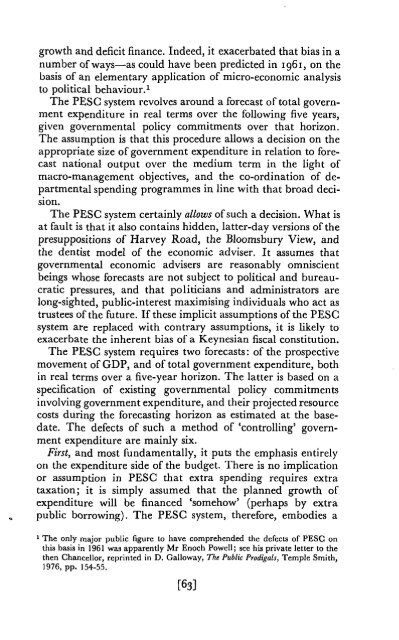THE CONSEQUENCES OF MR KEYNES.pdf - Institute of Economic ...
THE CONSEQUENCES OF MR KEYNES.pdf - Institute of Economic ...
THE CONSEQUENCES OF MR KEYNES.pdf - Institute of Economic ...
Create successful ePaper yourself
Turn your PDF publications into a flip-book with our unique Google optimized e-Paper software.
growth and deficit finance. Indeed, it exacerbated that bias in a<br />
number <strong>of</strong> ways—as could have been predicted in 1961, on the<br />
basis <strong>of</strong> an elementary application <strong>of</strong> micro-economic analysis<br />
to political behaviour. 1<br />
The PESC system revolves around a forecast <strong>of</strong> total government<br />
expenditure in real terms over the following five years,<br />
given governmental policy commitments over that horizon.<br />
The assumption is that this procedure allows a decision on the<br />
appropriate size <strong>of</strong> government expenditure in relation to forecast<br />
national output over the medium term in the light <strong>of</strong><br />
macro-management objectives, and the co-ordination <strong>of</strong> departmental<br />
spending programmes in line with that broad decision.<br />
The PESC system certainly allows <strong>of</strong> such a decision. What is<br />
at fault is that it also contains hidden, latter-day versions <strong>of</strong>the<br />
presuppositions <strong>of</strong> Harvey Road, the Bloomsbury View, and<br />
the dentist model <strong>of</strong> the economic adviser. It assumes that<br />
governmental economic advisers are reasonably omniscient<br />
beings whose forecasts are not subject to political and bureaucratic<br />
pressures, and that politicians and administrators are<br />
long-sighted, public-interest maximising individuals who act as<br />
trustees <strong>of</strong>the future. If these implicit assumptions <strong>of</strong>the PESC<br />
system are replaced with contrary assumptions, it is likely to<br />
exacerbate the inherent bias <strong>of</strong> a Keynesian fiscal constitution.<br />
The PESC system requires two forecasts: <strong>of</strong>the prospective<br />
movement <strong>of</strong> GDP, and <strong>of</strong> total government expenditure, both<br />
in real terms over a five-year horizon. The latter is based on a<br />
specification <strong>of</strong> existing governmental policy commitments<br />
involving government expenditure, and their projected resource<br />
costs during the forecasting horizon as estimated at the basedate.<br />
The defects <strong>of</strong> such a method <strong>of</strong> 'controlling' government<br />
expenditure are mainly six.<br />
First, and most fundamentally, it puts the emphasis entirely<br />
on the expenditure side <strong>of</strong> the budget. There is no implication<br />
or assumption in PESC that extra spending requires extra<br />
taxation; it is simply assumed that the planned growth <strong>of</strong><br />
expenditure will be financed 'somehow' (perhaps by extra<br />
public borrowing). The PESC system, therefore, embodies a<br />
1 The only major public figure to have comprehended the defects <strong>of</strong> PESC on<br />
this basis in 1961 was apparently Mr Enoch Powell; see his private letter to the<br />
then Chancellor, reprinted in D. Galloway, The Public Prodigals, Temple Smith,<br />
1976, pp. 154-55.<br />
[63]












